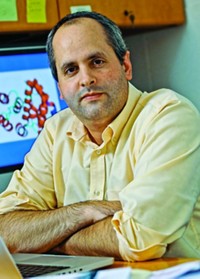Advertisement
Grab your lab coat. Let's get started
Welcome!
Welcome!
Create an account below to get 6 C&EN articles per month, receive newsletters and more - all free.
It seems this is your first time logging in online. Please enter the following information to continue.
As an ACS member you automatically get access to this site. All we need is few more details to create your reading experience.
Not you? Sign in with a different account.
Not you? Sign in with a different account.
ERROR 1
ERROR 1
ERROR 2
ERROR 2
ERROR 2
ERROR 2
ERROR 2
Password and Confirm password must match.
If you have an ACS member number, please enter it here so we can link this account to your membership. (optional)
ERROR 2
ACS values your privacy. By submitting your information, you are gaining access to C&EN and subscribing to our weekly newsletter. We use the information you provide to make your reading experience better, and we will never sell your data to third party members.
Analytical Chemistry
New Director Named For NIH Basic Research Institute
Government: Biochemist Jon R. Lorsch will lead National Institute of General Medical Sciences
by Britt E. Erickson
March 26, 2013
The National Institutes of Health has selected Jon R. Lorsch, a biochemist and leader in RNA biology, to direct the National Institute of General Medical Sciences (NIGMS). Lorsch, a professor in the biophysics and biophysical chemistry department at Johns Hopkins University School of Medicine, expects to make the move to NIH this summer. He will replace Acting Director Judith H. Greenberg, who has been leading the institute since Jeremy M. Berg left for a position at the University of Pittsburgh in July 2011.
As NIGMS director, Lorsch will oversee a budget of about $2.4 billion. The majority of that money funds basic research in the biomedical sciences, including more chemistry-related research than any of the other 27 NIH institutes and centers. NIGMS supports about 11% of NIH-funded grants, or about 4,600 grants each year. The institute is also well known for supporting research training and programs intended to increase the diversity of the biomedical workforce.
Calling Lorsch “broad-minded” and a “visionary thinker with strong management skills,” NIH Director Francis S. Collins says he is confident that Lorsch will help keep the U.S. at the forefront of biomedical research.
Lorsch holds a Ph.D. in biochemistry from Harvard University and has published more than 60 peer-reviewed research articles. He is well known for his work on dissecting the molecular mechanics of translation initiation, the assembly of a ribosome on a messenger RNA molecule. Translation initiation plays a key role in controlling gene expression. Disruption of the process can lead to numerous human diseases.
What excites Lorsch the most about becoming the NIGMS director is the opportunity to help support breakthroughs in understanding living systems. “We have incredible new tools to interrogate the inner workings of biological systems—from free electron lasers to genomic approaches that allow us to locate each transcribing RNA polymerase or translating ribosome in a cell,” he says. “I am eager to help find the best ways to use methods at all scales, atomic to whole organisms.”
At Johns Hopkins, Lorsch was also passionate about reforming the curricula for graduate and medical education. He launched a summer research program for high school students, including those from groups that are typically underrepresented in the biomedical sciences. In his new role as NIGMS director, Lorsch says he will remain “committed to catalyzing innovations in scientific education and to producing the best-trained and most diverse biomedical research workforce in the world.”






Join the conversation
Contact the reporter
Submit a Letter to the Editor for publication
Engage with us on Twitter